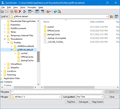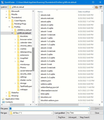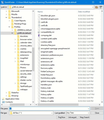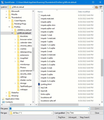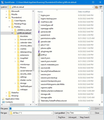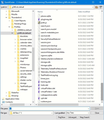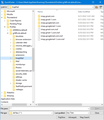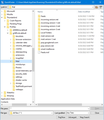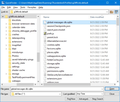
Restoring email, address book, etc. from User\AppData\ files
I am a Windows 10 user. I just had a new SSD installed to replace my failing HDD, but was unable to migrate any of the files from the old drive to the new drive. I'm working with a fresh OS installation and needing to install every program pretty well from scratch. I did back up Thunderbird's databases and probably most settings, using Norton 360's backup utility.
I need to restore my Thunderbird mail accounts, address book, etc. before this weekend. (There's an important email in there that I need to print out to be able to participate in an event on Saturday!) However, I never backed these up to a ZIP file. But I did back up and was able to restore all of the required data files and (maybe?) the profile files contained in \users\{username}\appdata\Local and ...\Roaming to their original locations. How do I get Thunderbird to recognize and use these files? I have already downloaded and installed Thunderbird from the Mozilla TBird website.
I was able to get my program settings for WordPerfect and Waterfox to work just by restoring appropriately to AppData. But I suspect there are some extra steps to make this work with Thunderbird.
It's important that I be able to restore my email and address book. I leave nothing on remote email servers, and I have saved over 20 years of email on my computer... but it's all in the database files!
Please advise what my best course of action would be. (Could it be as easy as entering the profile "names" that are the names of the folders in \Local and \Roaming somewhere in Thunderbird?? If so... where?)
Many thanks.
Mark Victor
Toutes les réponses (12)
If you restored the full profile, you can click windows key and 'r' key and in the next window enter thunderbird.exe -p to invoke profile manager. when that starts, click the 'create profile' button, then next, then enter a name, and after doing that, click the browse button to locate and activate your profile.
Technically, here is what happens: when Thunderbird starts, it immediately opens c:\ussers\<yourID>\appdata\roaming\thunderbird\profiles.ini to get the location of the profile. You could also do that manually, if desired, but the profile manager ensures it's done right.
Not quite there yet — nothing displays, just blank TBird w/ the profile I need to load.
Before selecting the profile folder, should I rename the profile folder that I want to use to delete ".default"? Will that work? (<profilename>.default -> <profilename>) Maybe delete profile.ini to rebuild it?
BTW, is there a command line switch/syntax for repairing the profile data (i.e., mail db's, calendar)? My restored data is a week older than when the HDD failed, and I believe it's not corrupted (but you never know...).
Appreciate your help so far and your explanation of how the .INI works. I thought there was a command line switch... seem to remember using that some eons ago.
Many thanks!
Mark Victor
On your question, the profile name isn't important. Thunderbird opens whatever is pointed to by profiles.ini. If you post a screenshot of your profile, plus a screenshot of Mail and Imapmail folders, someone here may recognize missing elements. If you delete profiles.ini, Thunderbird won't load.
Screenshots of files in user profile folders attached.
My user name changed (thanks to the tech who replaced my c: drive) from MV to Mark. I notice files with "security" as part of their names. Is this a problem?
Restored backup files are all the same date, unless modified by "incomplete startup".
Profile beginning w/ "g" has the data I need — especially the address book. Willing to run a utility to get that address book data into, say, one comma-delimited file.
Thank you, David.
Mark Victor
Forgot IMAP and POP folders...
Well, I see nothing wrong, but I'm not as experienced as many here. However, if there is an important message you need, it may be there. Look in whatever account it might have been in. Folders are generally in twos (e.g., INBOX and INBOX.msf). Copy the probable folder to Mail/Local Folders and then start Thunderbird to see if you can browse the folder.
If you could, please feel free to refer my case to a volunteer with more experience, or preferably to a Mozilla tech. This seems to be a hard nut to crack.
I have multiple mail folders for my personal mail account — incoming.verizon.net, through incoming.verizon-3.net. Which one contains the most recent inbox and inbox.msf messages?
But — I already have inbox and inbox.msf files in Local Folders. They should have displayed, too, when I started TBird, right? Note that even the local folders don't display when I start Thunderbird; the left pane is completely blank.
Other things I mentioned before but may be factors(?):
- My user name for Windows is different than before ("Mark" instead of "MV"). This was done by the tech who installed my new SSD drive. Does TBird do a security check to make sure only the "correct" user accesses data?
- In the Local\Thunderbird\Profile\g... folder is a file, ".startup-incomplete". Is this a text file, and could it provide some clues?
- I've sorted my "g..." profile files by date so one can see which ones were modified when I tried starting TBird through the Profile manager (thunderbird.exe -p). Possible clues here?
I really, really, really need my address book! Any way of getting at that w/o having to write SQL?? (The syntax will kill me, especially the "joins", and I'm not good at it — and I've never done javascript.)
I'm reticent to try things on my own w/o running them by you folks first. Can't afford to lose or not be able to access stuff.
A suggestion for TBird developers: Include an automatic (or periodic manual prompt) backup to ZIP for the profile (or accounts, address book, and calendar etc.) that can be imported back into the program using the Import feature. Simply backing up the profile folders and files and restoring them is obviously problematic.
Mark Victor
There is no security check on id. And youhave multiple iterations of your addressbook, and I believe they can only be reconstructed by the profile in which they were created (although the basic abook.sqlite is exempt from that). I don't have direct contact with other volunteers, but one may see this.
Followed migration instructions at https://support.mozilla.org/en-US/kb/moving-thunderbird-data-to-a-new-computer and I'm now able to access my address book (which I immediately backed up into other formats [2]). Deleted both profiles in Thunderbird\Local and the other profile ("d") in both Local and Roaming (saved everything in another location before deleting). Migration instructions do not specify Local or Roaming folder, but Roaming has all the data.
When using thunderbird.exe -p, address book does not load. Only one profile in profile manager — default.
Still can't see mail folders in left pane. No calendar. But I confirmed that I can send mail. Just no "Sent" folder. Will test other email accounts and see if they work. Also, TBird is notifying me by sound that I've received mail but, obviously, I can't see it.
I also notice significant GUI changes and some menu changes in TBird.
Corrupt file somewhere? Utility available from Mozilla to rebuild db files?
TBird also generated error when I exited. No change from the above behavior when restarted.
I will try backing up everything again, uninstalling Thunderbird, and reinstalling, copying original unchanged "users" files using migration instructions (only "g" profile in Roaming) from external backup source, and not using command w/ -p switch. Will then try to access account settings and analyze other settings.
I really need [a] solution[s]. Please keep helping w/ any suggestions that all you in the community may be able to give as to other things I can try.
I am using this forum to document my actions for future reference by myself and the community.
Mark Victor
Mark, thank you for thinking of the larger community.
Check prefs.js for directory names that might need to be changed, because you changed computers.
Also, after startup check Error Console under Tools > Developer
And, what version of Thunderbird were you running on the prior disk?
Wayne Mery et al,
Thank you for your suggestions. I took a couple of weeks off from trying to solve this problem so I could get some other things done... so sorry for the late follow up.
At the top of prefs.js (opens in NotePad) is the comment, "//DO NOT EDIT THIS FILE." In my case (and since I never load a program while editing one of its operating files...!!), should I go ahead and edit? (Already backed up to .old) I found some user_pref statements that refer to my old user in the path statement that are incorrect, and I wish to change them without loading Thunderbird and using about:config (which would change some files that probably shouldn't be changed...).
Also, I suspect that Thunderbird could be not loading my calendar. In ...\{profilename}\calendar-data. I noticed that the progress indicator in the status bar stopped at about the 65% point. Inspecting the calendar data files, I find that the local.sqlite file is much larger than the files in the ...\calendar-data\backup folder that are of an earlier date than when I restored these files to my new hard drive. (The latest file in \backup [one day after restore] is the same size as local.squlite.) Losing a few appointment dates is o.k.; if I can get most of it back, that's good enough. So I'll try renaming and moving a couple of files (done that before, many times...!).
But I think first I should clean up prefs.js — right?
As for Thunderbird version, my pre-HDD-crash version was either the same or only back one or two minor or update versions. Pre-crash, I think I had already installed the major updates with the significant GUI changes.
Many thanks for your help, and I look forward to your reply to my current questions.
Mark Victor
Modifié le
I need an answer to my query of October 11. Thunderbird often crashes when exiting the program. Report sent to Mozilla after the crash notes that it occurred before "write-to-profile". Otherwise, pretty well everything is working... but I lost all of my calendar and am still rebuilding that and Tasks. Calendar notifications work now w/o problem. No crashes yet while TBird is running — only when exiting (using Alt+F4).
Should I clean up prefs.js so that all of the relevant commands refer to my current Windows user name? That username changed, thanks to the tech who put in my new SSD and installed Win10.
A quick response (or longer) would be appreciated. Many thanks.
Mark Victor

